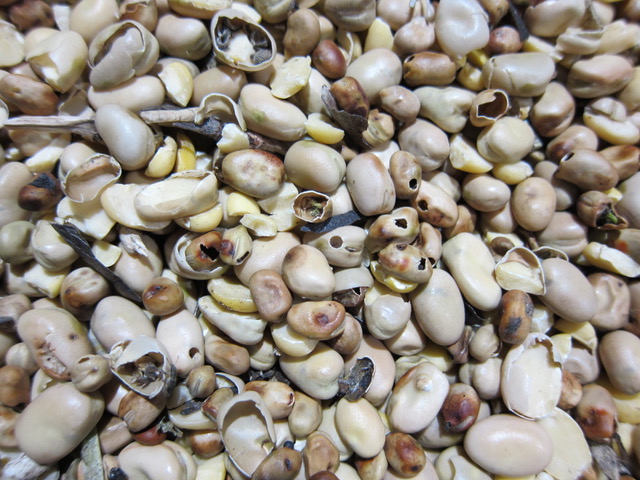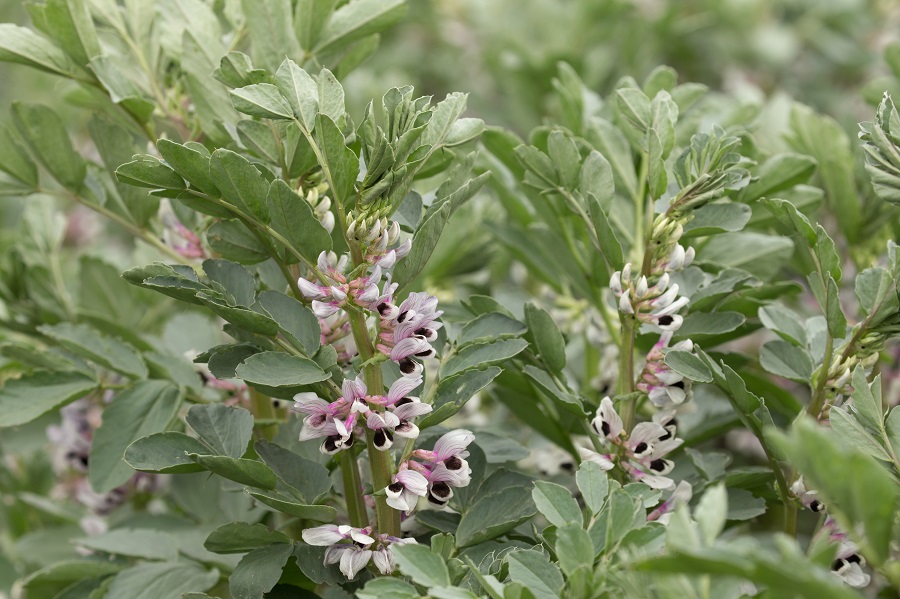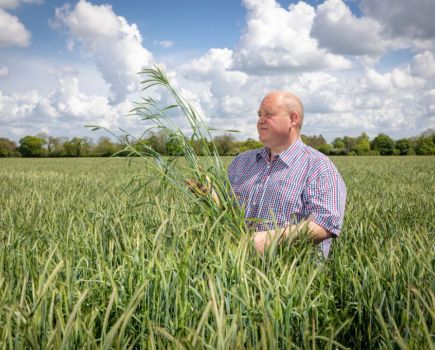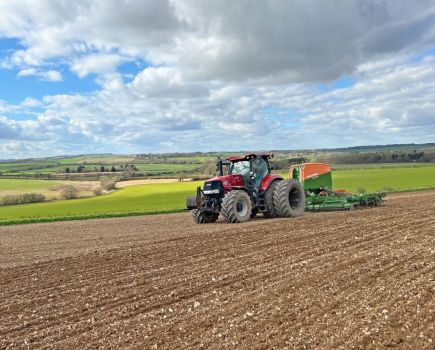Spring beans grown for animal feed on a special contract are proving to add agronomic and marketing value to a farming business in Yorkshire. CPM finds out exactly what Tiffany has to offer.
The contract guarantees us a market price at £50 over feed wheat.
By Rob Jones
Spring feed beans on a specialist contract for the Waitrose Farming Partnership are adding to the agronomic and marketing flexibility that is key to minimising risk across Hartley Farming’s 1020ha of arable cropping at Birkin in North Yorkshire, says Velcourt manager, Rob Yardley.
Beans have been a standard part of the rotation on the Aire flood plain for the past three years, which also includes winter and spring barley, winter oilseed rape, vining peas and potatoes. To broaden it further and better manage the land – much of which is heavy, wet and cold – he’s been introducing cover crops, stubble turnips for sheep grazing and, most recently, winter linseed.

Bruchid beetle damage in beans can be a problem but the Tiffany contract has a maximum 2% admix.
Rob swaps wheat straw for pig muck, which he believes makes a valuable contribution to soil health, as do long-term grass leys for haylage on some of the most difficult ground.
“We’ve grown spring beans for the human consumption market for a while now. They suit us well, delivering a decent margin and providing a spring break that’s really valuable for our grassweed control, although bruchid beetle can be a headache with such a tight control window.
“Until last season we avoided feed beans because we didn’t want to be at the mercy of the feed market. But we didn’t realise you could grow them for an assured market and earn a premium. So, when our Agrii seed specialist, Rebecca Gibson told us about the Tiffany contract for Waitrose we decided to give it a go. And we’re very glad we did,” he says.
“We drilled around 40ha of Tiffany – about a quarter of our crop – in our normal spring bean slot (between two first wheats) in early March. After a bit of a slow start they took off strongly to deliver our highest average yield of the season at around 4.5t/ha in the second week of Sept. We weren’t expecting more than 4t/ha,” he adds.
“The contract’s specification and pricing suit us nicely too – all we have to deliver is a 15% moisture content and maximum 2% admix. With sufficient storage, we’re aiming for movement between Jan and May. When we actually sell will depend on the wheat price because the contract guarantees us a market price at £50 over feed wheat. This combination of assurance and flexibility really helps us manage our marketing risk.”
While most of Hartley Farming’s beans continue to be sown into ploughed land, last year for the first time the Tiffany went in behind a cover crop of vetch, black oats and tillage radish. This was deliberately sown in mid-Sept to avoid an unmanageably large biomass.
Rob sees cover crops as another valuable tool for minimising risk. He’s using them to protect the soil over winter, encourage steady water infiltration, and add to the organic matter, nutrient cycling and biodiversity. But what he wants to avoid are huge canopies that shelter too much blackgrass from glyphosate treatment and leave excess trash that can get in the way at drilling.
Both the last season’s cover crop and the beans were drilled with a Väderstad Rapid – the cover crop went into wheat stubble with triple super phosphate (TSP) and pig muck incorporated with a subsoiler and the beans directly into the cover residue, following early destruction with glyphosate.
This season, the phosphate and manure have been incorporated and cover crops sown in a single pass with a Sumo Quatro, both to manage workloads at one of the busiest times of the year and to give a better-ridged and less-consolidated surface.
“It’s still early days for us with cover cropping. The combination of TSP, pig muck and subsoiling definitely helped us make the most of last season’s Tiffany by allowing us to sow earlier than our other bean crops. But we want to avoid the over-consolidation from two passes with a drill in just six months that I think led the spring crop to struggle a bit at establishment.”
Like last year, this season’s Tiffany will be going in when soil conditions are right and at around 60 seeds/m2 (depending on sowing time). Again, it will receive a robust pre-em to tackle both grass and broadleaf weeds and muriate of potash (MOP) soon after drilling to provide fresh available potash on ground where nutrient availability can be restricted.
While the crop had three fungicide sprays in the high risk 2019 season, if conditions allow Rob is aiming for two sprays this time round to minimise production costs, together with a timely bruchid beetle spray.
He plans to continue to avoid post-em herbicides, which can easily compromise the crop by de-waxing the leaves. At the same time, he will keep up a routine micronutrient programme based on tissue testing.
“This season we’re planning to weight our micronutrition towards earlier application to ensure we support the crop as well as we can in its foundation phase. We were very happy with the way things turned out last year, but we can always improve and need to be doing everything we can with all our cropping to ensure the most consistent production with an increasingly uncertain climate and marketplace.
“The Agrii contract for Waitrose has been important in allowing us to increase our bean growing without adding extra risk. Including the potato and vining pea land, around a quarter of our cropping is now spring-sown. I think this is about right here, but wherever we need to, mainly for blackgrass control, we’ll increase our spring barley growing,” says Rob.
“As well as balancing our winter and spring cropping, we try to maintain the best balance of growing for defined markets with commodity cropping. We contract land out for potatoes and vining peas; grow winter barley for malting along with some milling wheats; and the winter linseed we’ve added this year – like the Tiffany beans – is all on an end-market contract.
“To take advantage of the particularly good market prospects for OSR, we’ve actually increased our area this year from 110ha to 150ha. The extra acreage has gone into premium HOLL rape for the first time, again on contract.
“It’s all about keeping our options open and planning to be flexible in both our agronomy and marketing. Premium-earning contracts for assured markets have become an increasingly important element in both respects for us,” he concludes.
Tiffany delivers carbon-saving for Waitrose
The contract for low vicine, low co-vicine (LVC) Tiffany beans, developed by Agrii for Waitrose pig and poultry producers, is part of the supermarket’s determined programme to reduce its food miles and carbon footprint.
It enables UK pork, poultry and eggs to be produced with less imported soya by taking advantage of increased inclusions of traceable, home-grown bean protein without the anti-nutritional factors that would otherwise prevent it.
“The opportunity offered by LVC beans was originally identified through the four-year Optibean project,” explains Agrii seed manager, Rebecca Gibson.
“Our growing and feeding trials with Tiffany, which joined the PGRO Recommended List in 2019, gave Waitrose the confidence to recommend the bean’s inclusion in its Farming Partnership members rations. This, in turn, enabled us to develop and introduce initial area-based contracts.
“We’re looking to expand these as confidence in the variety’s feeding value grows among Partnership members. Victus, which joined the RL as an LVC variety alongside Tiffany, has a slightly higher yield rating but cannot be contracted yet as it has to be trialled for Waitrose. It also has a lower protein content.
“Our Tiffany contracts have the advantage of a very simple, easy-to-achieve specification – 15% moisture and 2% maximum admix. They offer a minimum of £5/t over the ex-farm feed bean price or £50/t over feed wheat at the time of movement; whichever delivers the best return,” explains Rebecca.
“The variety has proved to be very vigorous in our growing trials and in grower’s first season experience on-farm. Agronomically Tiffany has reasonable resistance to downy mildew, stands well and isn’t late to mature. We’ve found it to be well-suited to growing on heavy, cold land. Most importantly, though, it offers a really attractive alternative to growing beans for the free-market.”




